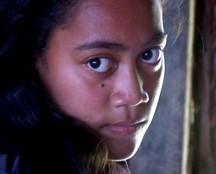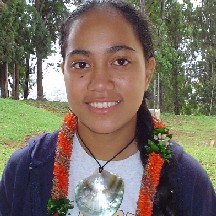Digital Collections
Celebrating the breadth and depth of Hawaiian knowledge. Amplifying Pacific voices of resiliency and hope. Recording the wisdom of past and present to help shape our future.
Kaleikipio‘ema Brown
First things first. You will not, in years to come, be able to carry on an intelligent conversation about indigenous film-making in the Pacific if you haven’t seen The Land Has Eyes. Vilsoni Hereniko’s "film for Rotuma" is every bit as important as Once Were Warriors and Whale Rider. Maybe more so. It was written, directed, and co-produced by a Native Rotuman; it features a cast that is 98% Native Rotuman—all of them new to acting; it was shot in Rotuma by a crew that was housed and hosted by Native Rotumans; it was filmed in the Rotuman language with English subtitles; and it is based entirely on Rotuman myth, history, and lifestyle. In short, it’s hard to conceive of a film that could, in all but its technical and musical aspects, be more Native. Billed as "a small film with a big resonance," The Land Has Eyes has been held over, through March 24, 2005, at the Dole Cannery Theaters; it is screened daily at noon, 2:30, 5:00, and 10:00 p.m. Mai noho ‘oe a ‘ikemaka ‘ole; don’t not see it.
Rotuma is an isolated island, nine miles by two, about 300 miles north of Fiji. The Rotumans, 2,500 of them, are Polynesians with their own distinct language, but they have been politically tied to Melanesian Fiji since British colonization in 1881. Vilsoni Hereniko is a Native Rotuman who, like his heroine Viki, won a scholarship to further his education at Queen Victoria School in Fiji. Now a professor at the Center for Pacific Island Studies, University of Hawai‘i at Mānoa, Hereniko, like Viki, has abided by the words of Hapati, Viki’s father: "Never forget who you are or where you come from." And like Viki again, he has dedicated himself to the path set by Hapati for his role-cramped daughter: "Study hard so one day your pen will buy all you need."
In Pear ta ma ‘on Maf – The Land Has Eyes, Hereniko’s pen (may it buy all he needs) tells a simple, loosely autobiographical story. Viki’s father is falsely accused by his wealthy neighbor of stealing coconuts for copra. The neighbor bribes the court translator to misinterpret Hapati’s testimony to the British judge. Neither Hapati nor the judge understands the other’s language, so Hapati is found guilty of theft and given a year to pay a fine that is well beyond his limited means.
Viki, the daughter who "must know everything," has been hiding beneath the judge’s window. When she explains the miscarriage of justice to her father, he refuses to return to the courtroom because he has been "shamed enough" and because he believes in the Rotuman proverb: "The land has eyes, the land has teeth, and knows the truth." Justice, he implies, will come in due time and in its own way to those who are faithful to the land. He holds quietly and unapologetically to this proverb with a conviction that his wife unhappily defines as "greater than your belief in Jesus."
Hapati’s faith is not without heartrending consequences familiar to all native people whose struggle for dignity, identity, and harmony often taxes the spirit beyond the body’s ability to resist and endure. Hapati dies, his fine unpaid, his family vilified, his body wracked by chills, but his spirit still blazing. Hapati’s legacy of flame and belief ignites in Viki a firestorm of anguish from which a new warrior-woman emerges whose courageous, convention-defying nature is, in fact, as old as the founding myth of Rotuma itself.
The Land Has Eyes opens with Hapati’s retelling of this myth. Seven brothers and their sister travel, by voyaging canoe, from Samoa to Fiji. The eldest brother subjects his sister to an "unforgivable act" and then abandons her on a remote, uninhabited island. Through hard work and fierce determination, she defies all odds, survives, gives birth, and becomes known to later generations as the first inhabitant and Warrior Woman of Rotuma.
Like her Warrior Woman ancestress, Viki is faced with the most basic of choices: sink or swim, submit or resist, accept or redefine. Both women choose to assert themselves, but theirs is the paradoxical kind of self-assertion that ultimately results in the greater good. The Warrior Woman founds, on the ashes of rape and abandonment, a Rotuman world in which harmony prevails. Generations later, in Viki’s time, Rotuma falls victim to colonialism’s more subtle but equally sinister assault. Viki restores the old harmonies, or at least gives Rotuma a big shove in the right direction, when, during her climactic, scholarship interview, she becomes the voice—and teeth—of her land. Once the tempest of ancient justice subsides, a thankful chief assures Viki that "your family name will become a sweet fragrance" to all Rotuma.
Reviewers of The Land Has Eyes tend to characterize Viki’s success as the result of her ability to unify her native heart and non-native brain, of her ability to balance her traditional values and western ambitions. She restores her family’s good name and goes to Fiji to satisfy her intellectual curiosity; she defends her heritage and holds true to personal aspiration; she speaks for the land and wins a ticket to leave; she has her cake and eats it too. Interpretations of this sort are subtly demeaning of native intelligence and motivation. They imply that intellectual interests are somehow at odds with indigenous culture, and they imply that the pursuit of western academic success represents a selfish abandoning of native culture. Not so. Not so at all. One need look no further than Hereniko himself to understand that genius is fostered in native homes and that many of us have left these homes for the specific purpose of acquiring the weapons necessary to defend, define, and celebrate our people. That’s what I see when Viki, at story’s end, gets on her boat for Fiji. Her pen is left behind in the hands of the boy who loves her. They wait for her return, both boy and pen. When she returns, they will make warriors and she will write truth.
Noenoe Silva, in her recently published Aloha Betrayed, defines native pen-wielding as the "war of discourse." She notes that Hawaiians have been waging this war since "No ka Pono Kahiko a Me ka Pono Hou" (Concerning the Ancient Pono and the New Pono) appeared in 1834 in the first edition of Ka Lama Hawai‘i, our first Hawaiian language newspaper. We are, then, less than 30 years away from two full centuries of battle by essay, letter, mele, and mo‘olelo. Hereniko’s momi of a movie calls attention to a genre of discourse in which we are sadly underrepresented; The Land Has Eyes reminds us of the need for more pens and voices. It won’t be long before Sony and the Rock tell us the story of Kamehameha in much the same way that Disney told us the story of Lilo’s ‘ohana. Someone else will again have control of the silver-screen narrative; we won’t. "The time has come for Pacific Islanders to be not just consumers of other people’s images of themselves," Hereniko says. We have our own Woman Warriors, our Hi‘iakas, Keaomelemeles, Manonos, Lili‘us, Pi‘ilani Ko‘olaus, and the Vikis who emulate them. We have many movies to make of stories that only we can tell.

photo credit: Te Maka Productions
Sapeta Taito plays Viki, the Rotuman girl who fights to maintain her family’s honor after her father has been unjustly convicted of stealing from a wealthy neighbor.

photo credit: Ka‘iwakīloumoku staff
Sapeta Taito talked story with Ka‘iwakīloumoku in January 2004 after she returned from the Sundance Film Festival.